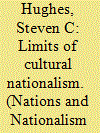| Srl | Item |
| 1 |
ID:
111489


|
|
|
|
|
| Publication |
2012.
|
| Summary/Abstract |
This article brings the thought of Giuseppe Mazzini back into the field of nationalism studies, from which it has been largely missing for a half century. It suggests the following: that Mazzini is much more modern and secular than he is usually portrayed; and that his commitment to liberal policies while rejecting liberal principles suggests that the distinction between civic and ethnic nationalism has been misconceived. Nationalism, to Mazzini, was not an end in itself but a means to an end - government of, by and for the people. The demand for such a government was manifested in three popular demands in nineteenth-century Europe: in the West as democracy, in the East as national sovereignty (the precondition for democracy) and in both East and West as social democracy. Thus nationalism may be instrumental rather than an end in itself, and it may be attributable not to ethnic groups' natural striving for autonomy but to the pursuit of democracy.
|
|
|
|
|
|
|
|
|
|
|
|
|
|
|
|
| 2 |
ID:
111490


|
|
|
|
|
| Publication |
2012.
|
| Summary/Abstract |
This article critiques the 'cultural turn' in Italian Risorgimento historiography by examining Italian Switzerland, and specifically Ticino. This area paradoxically aided and abetted Italian patriots, especially Giuseppe Mazzini, yet rejected becoming part of the Italian national project. This paradox is heightened by the fact that the vast majority of the Italian nationalist literary canon, as identified by Alberto Maria Banti, was republished in Ticino. The paradox is explained in terms of the conflict between long-standing traditions of local autonomy and the idea of any form of uniform or centralised control, as originally represented by the Cisalpine Republic and then by both versions (Napoleonic and Piedmontese) of the Kingdom of Italy. However, I also use Banti's cultural concepts to demonstrate the creation of a powerful counter-myth of Italian Swiss nationalism in the character of William Tell.
|
|
|
|
|
|
|
|
|
|
|
|
|
|
|
|